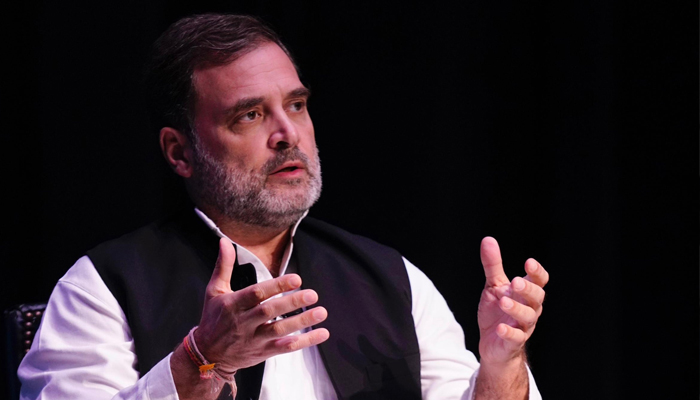
Dallas: Leader of Opposition in Lok Sabha, Rahul Gandhi, said that Congress party will think of scrapping reservations when India becomes a “fair place,” which it is not. Rahul Gandhi is on a tour of the United States where he addressed and took part in an interaction. The Congress leader was interacting with students and faculty at Georgetown University in Washington, DC, on Monday (local time).
He also reiterated the need to conduct a caste census while saying that 90 percent of the country’s population — OBCs, Dalits and Adivasis– not having proper representation in the country is the “elephant in the room.”
“There’s an elephant in the room. When we talk about the capture of institutions, businesses, and the media, the elephant in the room is that 90% of India–OBCs, Dalits, Adivasis–aren’t even part of the game. That’s really the elephant in the room,” Rahul Gandhi said.
He further said that the Caste Census is a simple exercise to assess the participation of lower castes, backward castes, and Dalits stand since independence.
The LoP in Lok Sabha asserted that there is hardly anyone from the backward communities among the top 10 businesses, media industry or the highest courts. Beyond the caste census, he also asserted the need to conduct socio-economic and institutional surveys in the country.
“Out of the top ten businesses in India, almost none are owned by the 90 percent of the population. In the highest courts of the country, there is almost no participation from this 90 percent. In the national media–anchors and journalists–there is zero participation from lower castes, OBCs, Dalits, and Adivasis,” the Congress leader said.
“There are two components. One is a socio-economic survey. We want to understand the socio-economic position of these castes. The third component, which I think is very important, is that we also want to understand and examine India’s institutions–media, healthcare, education–the ownership, the structure that delivers these services, and India’s participation in these institutions. These are an institutional survey, a socio-economic survey, and a census,” he further added.
Being asked about his stand on reservation, Rahul Gandhi said that the Dalits, Adivasis and OBC communities are still not getting participation in the system, adding that India is not a “fair place.” The Leader of Opposition in Lok Sabha further stressed that the INDIA bloc wants to defend the Constitution and most of the alliance partners agree on holding a caste census, adding that ‘two businessmen’ should not run every business in the country. He also attacked the BJP for terming the INDIA bloc as ‘INDI alliance’.
“We (INDIA alliance) agree that the constitution of India should be defended. Most of us agree on the idea of caste census, two businesspeople, Mr Adani and Mr Ambani, should not run every single business in India…We have run governments again and again, which have been successful using coalition. We are pretty confident that we can do it again…It is not the INDI alliance that the BJP is framing. It’s the INDIA alliance…The whole idea of the alliance was to put across the people that India is being attacked and it was very successful,” Rahul Gandhi said.
Furthering his attack on the NDA-led government at the Centre over the economic situation in the country, the Congress leader said that India has just stopped producing, amid rising social tension, and unemployment in the country. He also termed GST as “anti-production.”
“If you look at global production in 40s and 50s, it was carried out by the United States and by the West…The West and India handed that over to the Chinese…China organizes production. West, India, America organizes consumption…India has just stopped producing. If you look at our top businesses, Adani, Ambani, they don’t produce anything…There is a whole set of structures that don’t allow production. GST is anti-production…The large monopolies don’t want India to produce…Social tension and unemployment are rising…The Indian government has waived off Rs 16 lakh crores in bank loans to 25 business people. How many of those people were producers? How many small and medium-sized businesses were waived off their loans? Not a single one,” he further stated.
